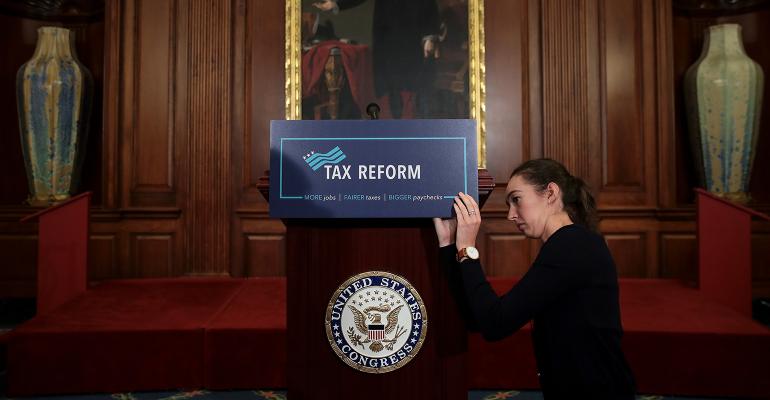Electing Small Business Trusts
While limited liability companies taxed as partnerships have been the default choice of entity for most businesses for decades, there remain millions of S corporations owned by individuals. Thus, estate planning frequently (and in the view of the authors, almost always) results in assets, including S corp shares, being held in trust. Nevertheless, only certain specific types of trusts may hold S corp stock long term: grantor trusts with respect to individual U.S. taxpayers (which may be used less frequently after the Tax Cuts and Jobs Act); qualified subchapter S trusts; and electing small business trusts, or ESBTs, according to Internal Revenue Code Section 1361(c)(2)(A). In addition, some, but not all, tax-exempt entities may be shareholders of S corps.
Practitioners should become familiar with the intricate planning opportunities afforded under the Act to determine how and whether to employ ESBTs as part of an overall wealth transfer strategy. The Act raises the following important considerations:
- Lowered maximum individual tax rates to 37 percent.
- Possible application of the pass-through deduction for qualified business income.
- Considerations of possibly forfeiting S corp status to take advantage of the lower 21 percent corporate tax rates.
- New bonus depreciation and larger IRC Section 179 expensing deductions that may flow through to the S shareholders, including an ESBT.
- Limitations on the deductibility of state and local taxes by individuals and trusts, which may prompt the review of the situs of some ESBTs and the possible move to a state with lower tax burdens.
Unlike many of the provisions set forth in the Act, the changes relating to the ESBT are made permanent.
ESBT Taxation Post-Act
The portion of a trust owning stock of an S corp with a valid ESBT election is treated as a separate trust, while the other assets are treated as though held by a separate trust, which could be treated as a simple or complex for income tax purposes. The ESBT is generally taxed on its share of the S corp’s income at the highest rate of tax imposed on individual taxpayers. The Act has reduced that maximum rate to 37 percent, although the net investment income tax of 3.8 percent under Act Section 1411 may also apply. In addition, if the new pass-through deduction rules under Act Section 199A apply, the S corp income may be eligible for an additional deduction of up to 20 percent, thereby lowering the effective rate.
Though distributions from a complex or simple trust would ordinarily pull out income to the recipient beneficiary, an ESBT’s net income (whether distributed by the ESBT or not) isn’t taxed to the beneficiaries of the ESBT. A beneficiary of a trust with an ESBT portion would only be taxed on the distributable net income under IRC Section 643(a) from the non-ESTB portion of the trust, if any.
ESBT Beneficiaries
Generally, the eligible beneficiaries of an ESBT include individuals, estates and certain charitable organizations eligible to hold S corp stock directly. A nonresident alien individual may not be a shareholder of an S corp and may not be a potential current beneficiary of an ESBT. The Act expands the list of permissible beneficiaries of an ESBT to allow a nonresident alien individual to be a potential current beneficiary of an ESBT. A nonresident alien still isn’t an eligible shareholder of an S corp.
Planning consideration: If steps had been taken to exclude a nonresident alien from inadvertently becoming a beneficiary of an ESBT, this may now be reversed to permit such participation.
Charitable Contribution Deduction for ESBT
An S corp reports to each shareholder its pro rata shares of certain separately stated items of income, loss, deduction and credit. For this purpose, charitable contributions (as defined in IRC Section 170(c)) of an S corp are separately stated. The deductibility of a charitable contribution passing through from an S corp depends on the shareholder.
Planning point: An S corp may only make deductible contributions if the governing instruments of the S corp permits the Board of Directors to make charitable gifts.
Under prior law, the deduction for charitable contributions applicable to trusts, rather than the deduction applicable to individuals, had applied to ESBTs. Generally, a trust is allowed a charitable contribution deduction without limitation for amounts of gross income that are paid for a charitable purpose, pursuant to the terms of the governing instrument. No carryover of excess contributions is allowed.
The Act changes the charitable contribution deduction of an ESBT and provides that the rules under IRC Section 170 applicable to individuals should control the deductibility of charitable contributions attributable to the ESBT. Thus, the percentage of contribution base limitations and carry-forward provisions applicable to individuals apply to charitable contributions deemed made by the portion of an ESBT holding S corp stock. Further, the ESBT should be able to deduct the fair market value of long-term capital gain property gifted in-kind to charity, subject to applicable percentage limitations. The substantiation rules of IRC Section 170 would seem to apply, although those rules don’t generally apply to trusts.





